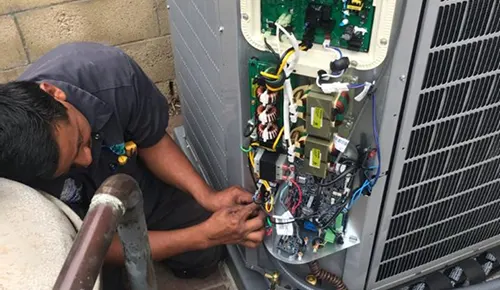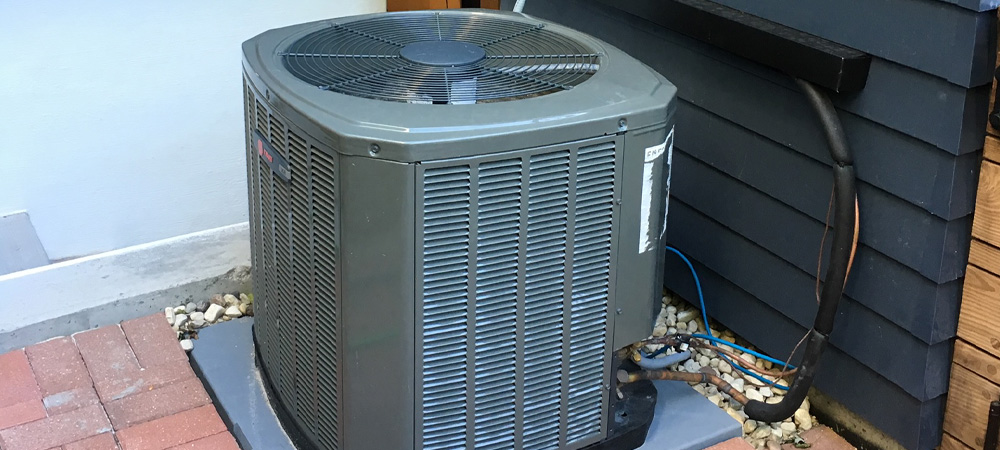Ac Air Conditioning Unit Repair Work: Repair The Cooling System To Bring Back Comfy Indoor Temperatures
Identifying Common Air Conditioning System Problems
Ever discovered yourself sweltering in the middle of a heatwave, only to understand your a/c unit isn't cooling as it should? It's aggravating, but more typical than you may think. Many property owners face these issues yearly, from unusual sounds to uneven air flow. Why does this occur?
Leading Concerns That Frequently Appear
- Refrigerant Leaks: When the cooling agent leaks, the air conditioning has a hard time to chill the air, leaving you with hot blasts rather of revitalizing breezes.
- Frozen Evaporator Coils: Ever observed ice accumulation? It's an indication the system's working overtime or air flow is blocked.
- Clogged Air Filters: Dust and particles can choke the system, triggering it to labor more difficult and possibly get too hot.
- Faulty Thermostat: Often, the culprit is as simple as a misreading thermostat, sending wrong signals to your system.
- Drain Issues: Water pooling around the unit? Blocked drain lines may be the sneaky villain here.
How to Recognize These Issues Early
Is your air conditioner making weird noises-- a grinding or rattling? That's a red flag. Or has your electrical costs inexplicably increased without a change in usage? Ineffectiveness typically hides behind such hints.

| Symptom | Possible Cause | Quick Repair Tip |
|---|---|---|
| Warm air blowing | Low refrigerant or compressor failure | Inspect refrigerant levels; call an expert for compressor issues |
| System will not switch on | Electrical problems or thermostat malfunction | Reset breaker; replace thermostat batteries |
| Water leakage | Obstructed drain line | Clear drain with a wet/dry vacuum |
Why Do These Problems Take place?
Consider your AC as a fragile ecosystem. Interrupt one part, and the entire system stumbles. Sometimes, it's overlook-- a forgotten filter change-- or external factors like power rises. What's clear is that disregarding early signs just turns minor problems into significant headaches.
Necessary Tools for Air Conditioning Repair Work
Ever found yourself staring at a frozen evaporator coil or a persistent compressor that refuses to hum back to life? You'll rapidly recognize that having the right tools isn't just a benefit-- it's a need. Envision attempting to gauge refrigerant pressure with a damaged gauge or patching a leak without a proper vacuum pump. The frustration is real, however the option lies in preparation.
Core Tools Every Service Technician Need To Have

- Manifold Gauge Set: For accurate measurement of refrigerant pressures-- this is your diagnostic compass.
- Air pump: Eliminating wetness and air from the system is important; skipping this action risks contamination.
- Multimeter: Electricity flows calmly, but a multimeter speaks volumes about voltage, existing, and connection.
- Fin Comb: Bent fins on the condenser can choke air flow. This easy tool brings back air flow effectiveness quickly.
- Refrigerant Leakage Detector: Pinpoint elusive leaks that may otherwise fly under the radar.
Pro Tips for Using Your Tools
- Never ever link assesses without first validating the system is off. It avoids damage to your instruments and safeguards your fingers.
- When using the vacuum pump, run it for a minimum of thirty minutes to guarantee all moisture is extracted-- faster ways here lead to system failure.
- Adjust your multimeter routinely; even slight errors can misinform fixing efforts.
- Use the fin comb gently; extreme force can trigger further damage.
What's frequently neglected is how these tools interaction. A refrigerant leak detector guides where to link your manifold evaluates to assess pressure drops accurately. Have you ever noticed how a basic tool swap can shave hours off a repair job? That's the sort of performance every service technician yearns for.
Step-by-Step Repair Work Recommendations for Your Air Conditioner
Ever stood sweating while staring at a stubborn air conditioning system that refuses to cool? The buzzing hum that all of a sudden turns into silence can be frustrating. How do you even start to untangle this web of mechanical misbehavior? Let's cut through the confusion with a clear, expert-guided procedure.
1. Identify the Core Issue
Before diving into repair work, ask: is the problem electrical, mechanical, or refrigerant-related? A fast test-- switch off the system and inspect the breaker. Tripped breakers typically conceal the source. Next, examine the thermostat settings. Often, the fix is as simple as recalibrating your thermostat or replacing its batteries.
2. Inspect the Air Filter and Coils
A clogged up filter or unclean coils can choke your a/c's effectiveness. Pull out the filter:
- If it looks dirty or dirty, switch it right away.
- Use a vacuum or soft brush to clean the evaporator coils carefully.
Keep in mind, an overlooked filter resembles trying to breathe through a scarf in a sauna-- inefficient and aggravating.
3. Take A Look At the Condensate Drain
Obstructed drains lead to water buildup, activating sensor shutdowns. Utilize a stiff wire or a wet/dry vacuum to clear the drain line. This quick fix prevents leakages that can cause larger headaches.
4. Test the Capacitor and Fan Motor
These elements typically fail calmly. Utilizing a multimeter, examine the capacitor for voltage consistency. If readings vary extremely or check out no, replacement is in order. For the fan motor, listen for grinding or irregular spinning-- indications of impending failure.
Quick Recommendation Table: Typical Signs and Fixes
| Sign | Probable Cause | Expert Idea |
|---|---|---|
| AC not cooling | Dirty filter or low refrigerant | Tidy filter initially; look for leakages with soapy water |
| Unit will not begin | Tripped breaker or malfunctioning capacitor | Reset breaker; test capacitor with multimeter |
| Water leaking inside | Obstructed condensate drain | Clear drain line to avoid overflow |
Now, you might question, "Is it truly worth attempting to repair this myself?" Consider this: numerous repair work hinge on persistence and the right tools rather than raw technical skill. A steady hand and a little bit of troubleshooting can save hours and dollars. As with any detailed device, the essential lies in understanding its language-- the hums, clicks, and silences-- and responding accordingly.
Unlocking Durability: Preventive Upkeep Tips for A/c Units
Ever discovered how a whispering breeze can turn into a suppressing heating system when your air conditioner fails? That subtle hum is typically the very first sign of unseen pressure. Overlooking these whispers can lead to a total breakdown simply when you require cool relief one of the most. But what if you could capture these early whisperings before they escalate?
Start with the filter. It's easy to ignore, yet a stopped up filter chokes airflow, requiring your unit to work overtime and spike energy usage. Changing or cleaning filters every thirty days throughout peak usage isn't simply great practice; it's a lifesaver for your a/c's performance.
Key Preventive Steps:
- Check the coils: Dirt accumulation on evaporator and condenser coils minimizes heat absorption and release. A mild brush or vacuum can restore their pristine condition.
- Clear the condensate drain: Blockages here can trigger water damage and boost indoor humidity. A simple wire or compressed air blast can keep this path clear.
- Inspect refrigerant levels: Too low, and your air conditioner stress to cool; expensive, and it runs the risk of compressor damage. Only certified service technicians must deal with refrigerant modifications.
- Check the thermostat's accuracy to prevent unneeded biking or discomfort.
Keep in mind the story of the old unit that froze solid one summer season? The perpetrator was a small leak that sneaked previous unnoticed. Small problems typically simulate normal wear however compound quickly. Staying ahead with routine examinations and seasonal tune-ups can prevent these hidden disruptions.
| Upkeep Task | Frequency | Impact |
|---|---|---|
| Filter Replacement | Every thirty days | Enhances air flow and lowers pressure |
| Coil Cleaning | Annually | Improves heat exchange effectiveness |
| Drain Clearing | Quarterly | Prevents water damage and mold growth |
| Refrigerant Check | Annually | Ensures optimal cooling efficiency |
Isn't it curious how the tiniest tweaks-- like tightening up loose electrical connections or lubing moving parts-- can spin your AC back to peak form? These aren't just repairs; they're financial investments in comfort. After all, a well-kept system doesn't just website cool; it whispers cool serenity, even in the most sweltering heat.
A/c Unit Repair Providers in Jacksonville, FL
Jacksonville, FL, is a dynamic city known for its extensive park system, stunning beaches, and busy cultural scene. As the most populous city in Florida, it uses a diverse variety of outdoor activities consisting of fishing, boating, and checking out the Timucuan Ecological and Historic Preserve. The city's warm environment makes air conditioning a vital part of day-to-day comfort for homeowners and organizations alike.
For those requiring to fix air conditioning unit, Bold City Heating and Air supplies skilled consultation and suggestions. They are all set to assist guarantee your cooling system runs effectively through Jacksonville's hot seasons. Reach out to them for a complimentary consultation to resolve your a/c repair needs.